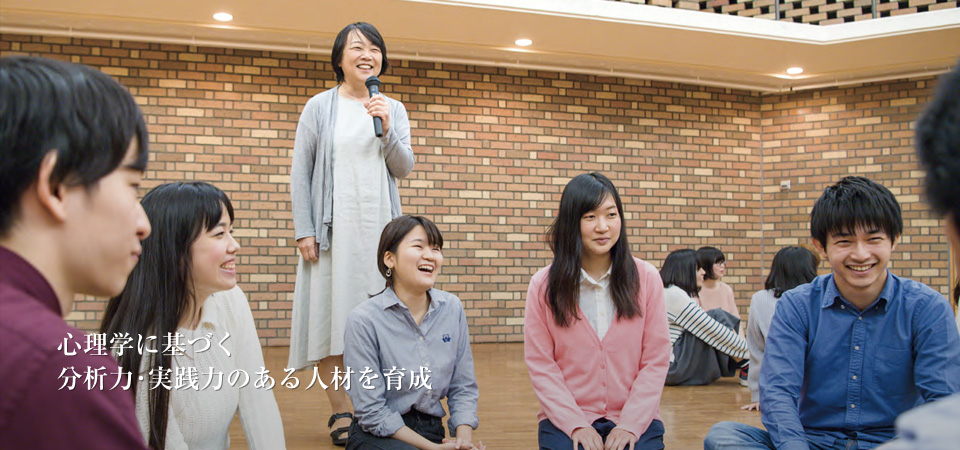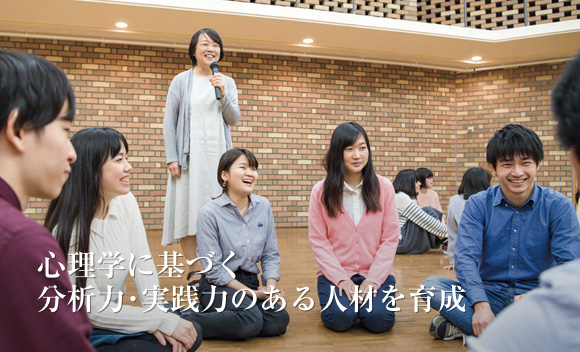Department of Psychology
Department of Psychology
Department of Education and Child Development


One of the distinctive characteristics of this department is that we profess “psychology that places value on relationships with society.” Developing knowledge from a scientific understanding of the mechanisms of the mind, we instill an ability to respond to any kind of person and circumstances in this increasingly complex society. That is, our students acquire practical abilities as well as analytical abilities based on the study of psychology. We expect to have students who are interested in scientific explanations of the mind and heart, and who hope to contribute to society by applying the knowledge and research methods of psychology that they have acquired.
Psychology
Content and Characteristics
Learn about all the areas of psychology
Our specialized courses are grouped in these areas: The Perceptual Psychology and Psychology of Learning Area, the Physiopsychology and Comparative Psychology Area, the Educational Psychology and Developmental Psychology Area, the Clinical Psychology and Personality Psychology Area, and the Social Psychology and Industrial Psychology Area. You can choose freely according to your own interests and career path. If you cannot decide how to choose, then you can refer to the model course enrollment patterns.
Instruction in small classes throughout, with full English-language training also available
Everyone is required to take Foundation Seminar 1 soon after they enter the university. It is held in small classes, and it teaches methods for studying psychology. That is followed by a large selection of classes, including seminars and experimental workshops, that are held in small groups and that continue in unbroken series throughout the four-year period to teach students practical psychology. This carefully and cumulatively implemented instruction in small classes builds a solid foundation for the study of psychology. It also encourages students to deepen their self-understanding, to consider how they can make effective use of their study of psychology after graduation, and to think about their post-graduation career. There is also small-class instruction in the English language that starts in the second year, teaching English for the study of psychology with a view also to international exchange and foreign study.
Four-Year Program Flow
First year: Students take outline courses, study research methods, statistics, and other such subjects, and acquire a foundation in psychology
Through foundation courses such as Mental Health and Outline of Psychology, students make a broad study of psychology theory and overviews. Through Statistical Methods of Psychology, Fundamental Statistics, and Psychology Research Methods, students acquire a foundation for explicating the human mind scientifically and empirically. In Foundation Seminar 1, which is held in small classes, students develop the logical thinking, writing, and discussion skills that are essential at university.
Second year: Practical study of psychology through workshops and the foundation seminar
The Outline of Physiopsychology and other of the five outline courses instill a deeper understanding of psychology. In Fundamental Experiments in Psychology and Survey Methods, students are trained in planning and conducting experiments and surveys and then organizing the results in a report, and through this learn methods for apprehending the mind scientifically. In Foundation Seminar 2, which is held in small classes, they further develop their ability to read and interpret specialized literature accurately and in depth, together with the presentation skills. In English Readings in Psychology, students develop their ability to read English-language literature of psychology.
Third year: Full-fledged study of psychology through workshops and specialized lecture courses
Six workshops are provided, including the Workshop in Observation and Interview Methods and Workshop in Clinical Psychology. Students can freely choose specialized courses such as School Psychology, Industrial and Organizational Psychology, and Criminal Psychology from the five specialized areas. In the Psychology Seminar 1, students receive instruction in seminar style from faculty members who are specialists in various fields of psychology and begin more specialized research according to their interests.
Fourth year: Pursue study in the seminar group and put the graduation thesis into order
In Psychology Seminar 2, which is organized in small classes, students hold discussions and give presentation based on their specialized perspectives, thereby comprehensively improving their skills in communication, their competence in conducting experiments and surveys, their ability to analyze data, and their ability to conduct scientific analysis. These results are channeled into graduation thesis research.
